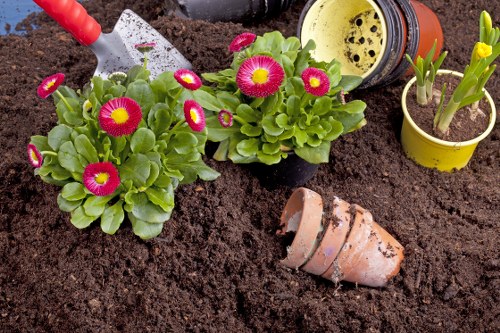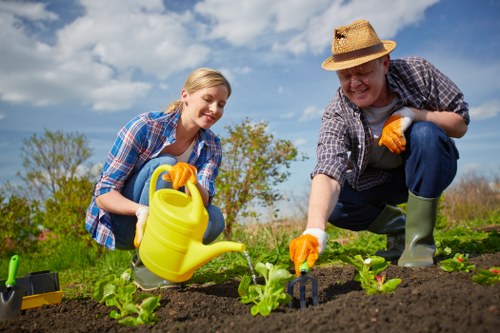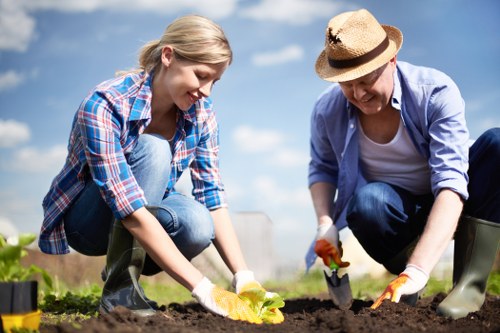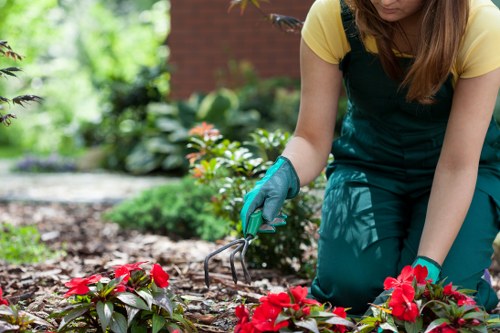Ultimate Guide to Garden Maintenance in Shortlands
Introduction to Garden Maintenance

Maintaining a beautiful garden requires dedication, knowledge, and the right tools. In Shortlands, where the climate and soil conditions are unique, effective garden maintenance is essential for thriving plants and a stunning outdoor space.
Whether you're a seasoned gardener or a novice, understanding the fundamentals of garden maintenance can help you achieve a lush and vibrant garden all year round.
In this comprehensive guide, we'll explore the best practices for garden maintenance in Shortlands, covering everything from soil preparation to seasonal care.
Understanding Shortlands' Climate and Soil

Climate Considerations
Shortlands experiences a temperate climate with mild winters and warm summers. This climate supports a diverse range of plants, but it's important to choose species that are well-suited to local conditions.
**Optimizing planting schedules** based on seasonal changes can ensure your garden remains healthy and vibrant throughout the year.
The region's rainfall patterns also play a crucial role in garden maintenance, influencing watering schedules and plant selection.
Soil Preparation and Health

Testing and Improving Soil Quality
Healthy soil is the foundation of a thriving garden. Conducting a soil test helps determine pH levels and nutrient content, allowing you to make informed decisions about soil amendments.
Adding organic matter like compost can enhance soil structure, improve drainage, and increase fertility.
Regularly turning the soil and minimizing compaction are essential practices for maintaining soil health.
Plant Selection and Landscaping

Choosing the Right Plants
Selecting plants that are native or well-adapted to Shortlands' environment can reduce maintenance efforts and increase plant resilience.
Consider factors such as sunlight exposure, water requirements, and growth habits when planning your garden layout.
Strategic landscaping not only enhances aesthetic appeal but also promotes healthy plant growth.
Regular Maintenance Tasks

Pruning and Trimming
Regular pruning helps maintain plant shape, encourages new growth, and prevents diseases. It's important to use the right tools and techniques to avoid damaging your plants.
Weeding is another crucial maintenance task that helps prevent unwanted plants from competing with your garden's desirable species.
Mulching can suppress weeds, retain soil moisture, and regulate soil temperature, making it an essential component of garden maintenance.
Irrigation and Water Management
Efficient Watering Practices
Proper irrigation is key to a healthy garden. Implementing efficient watering systems, such as drip irrigation or soaker hoses, can conserve water and deliver moisture directly to plant roots.
Scheduling watering times to early morning or late evening reduces evaporation and ensures plants receive adequate hydration.
Monitoring soil moisture levels helps prevent overwatering or underwatering, both of which can harm plant health.
Pest and Disease Control
Integrated Pest Management
Protecting your garden from pests and diseases involves a combination of strategies. **Natural predators**, such as ladybugs and birds, can help keep pest populations in check.
Regular inspection of plants allows for early detection and treatment of issues before they escalate.
Using organic or environmentally friendly pesticides minimizes harm to beneficial insects and the broader ecosystem.
Seasonal Care and Preparation
Adapting to Seasonal Changes
Each season presents unique challenges and opportunities for garden maintenance. In **spring**, focus on planting and fertilizing to kickstart growth.
During **summer**, prioritize watering and pruning to manage the intense heat and maintain plant health.
In **fall**, prepare your garden for winter by harvesting, composting, and protecting sensitive plants from frost.
Tools and Equipment for Effective Maintenance
Essential Gardening Tools
Having the right tools can significantly ease garden maintenance tasks. Invest in quality tools such as pruners, hoes, rakes, and watering systems to ensure efficiency and longevity.
Maintenance of tools is also important. Regular cleaning and proper storage extend the life of your gardening equipment.
Consider eco-friendly tools and sustainable practices to minimize your environmental impact.
Professional Garden Maintenance Services
When to Hire a Professional
While DIY garden maintenance can be fulfilling, certain tasks may require the expertise of a professional. Services such as landscape design, pest control, and major tree pruning are best handled by trained specialists.
Hiring a local garden maintenance service in Shortlands ensures that professionals understand the specific needs and challenges of the area.
**Benefits of professional services** include time savings, expert advice, and enhanced garden health.
Contact us today to learn more about our comprehensive garden maintenance solutions tailored to Shortlands' unique environment.
Eco-Friendly Garden Practices
Sustainable Gardening Tips
Embracing eco-friendly practices not only benefits the environment but also enhances the resilience of your garden. Incorporate techniques such as composting, rainwater harvesting, and using native plants to promote sustainability.
Reduce, reuse, and recycle within your garden by repurposing materials and minimizing waste.
Implementing organic gardening methods reduces reliance on chemical fertilizers and pesticides, fostering a healthier ecosystem.
Creating a Garden Maintenance Schedule
Planning and Organization
Developing a structured maintenance schedule ensures that all necessary tasks are performed consistently and promptly. **Create a monthly checklist** to track activities such as planting, pruning, watering, and fertilizing.
Use digital tools or garden journals to organize and monitor your garden's progress throughout the year.
Regularly reviewing and adjusting your schedule based on seasonal changes and garden needs promotes long-term success.
Book your service now to receive personalized maintenance plans and expert support for your Shortlands garden.
Common Garden Maintenance Mistakes to Avoid
Avoiding Pitfalls
Maintaining a garden can be challenging, and certain mistakes can hinder your progress. Overwatering, improper pruning, and neglecting soil health are common issues that gardeners in Shortlands should be aware of.
**Educate yourself** on best practices and seek professional advice when needed to prevent these common errors.
Staying informed and proactive helps ensure a thriving and beautiful garden.
Conclusion
Achieving a Beautiful Garden in Shortlands
Effective garden maintenance in Shortlands involves a combination of understanding local conditions, selecting appropriate plants, and implementing sustainable practices. By following the guidelines outlined in this article, you can create and maintain a garden that not only looks stunning but also contributes to the local environment.
Remember, whether you choose to manage your garden yourself or enlist professional help, consistent care and attention are key to achieving lasting beauty and health in your outdoor space.
Start your garden maintenance journey today and enjoy the rewards of a well-tended garden in Shortlands.